Diplomatic Bluebook 2025
Chapter 2
Japan's Foreign Policy by Region
3 LAC Countries
(1) Mexico
A presidential election was held in June in Mexico, and the ruling party candidate Claudia Sheinbaum Pardo was elected with a high vote share of approximately 60%, assuming the presidency in October. In addition, in the federal upper and lower house elections held on the same day, the ruling coalition secured nearly enough seats to amend the Constitution in both houses.
In regard to relations with Japan, in February, Foreign Minister Kamikawa, who was visiting Brazil to attend the G20 Foreign Ministers' Meeting, held a foreign ministers' meeting with Secretary of Foreign Affairs Alicia Bárcena Ibarra. In April, State Minister for Foreign Affairs Tsuge visited Mexico to attend the Congresso Nacional Nikkei (CONANI) and Expo Japón. In addition, from September to October, Ambassador on Special Mission NAKASONE Hirofumi (Member of the House of Councillors) visited Mexico and attended President Sheinbaum's inauguration ceremony, in addition to holding a meeting with incoming Secretary of Economy Marcelo Ebrard Casaubon and others.
In regard to economic relations, Japanese companies have continued to expand into Mexico in the context of nearshoring (establishing supply sources close to consumer markets), reaching about 1,500 companies, the highest number in the LAC region. During the September meeting between Ambassador on Special Mission Nakasone (Member of the House of Councillors) and incoming Secretary of Economy Ebrard, they shared recognition of the importance of bilateral relations, particularly economic relations, and confirmed that both countries would further strengthen relations under their new administrations.
In regard to relations with third countries, Mexico traditionally places importance on its relations with the United States (U.S.) and the LAC region. In September, President Andrés Manuel López Obrador and President-elect Sheinbaum held a meeting with President Lula of Brazil prior to his inauguration ceremony. At President Sheinbaum's inauguration ceremony in October, heads of state and ministers from various LAC countries, as well as heads of international organizations were in attendance, and President Sheinbaum held a meeting with President Miguel Díaz-Canel of Cuba.
(2) Central America (El Salvador, Guatemala, Costa Rica, Dominican Republic, Nicaragua, Panama, Honduras, and Belize)
In regard to relations with El Salvador, the inauguration ceremony for President Nayib Armando Bukele Ortez, who was elected for a second term in February, was held in June, and Parliamentary Vice-Minister for Foreign Affairs Hosaka attended as an Ambassador on Special Mission. In addition, in October, Vice Minister of Foreign Affairs Adriana María Mira De Pereira visited Japan for the second time following her visit in June. Vice Minister Mira and Parliamentary Vice-Minister for Foreign Affairs Hosaka signed a memorandum on the establishment of a policy consultation mechanism between Japan and El Salvador and held the first Japan-El Salvador Policy Consultation.
In regard to relations with Guatemala, Ambassador on Special Mission Hosaka (Parliamentary Vice-Minister for Foreign Affairs) attended the inauguration ceremony for President César Bernardo Arévalo de León held in January, and paid a courtesy call on the President. In May, Minister of Foreign Affairs Carlos Ramiro Martínez visited Japan, and a Japan-Guatemala Foreign Ministers' Meeting was held.
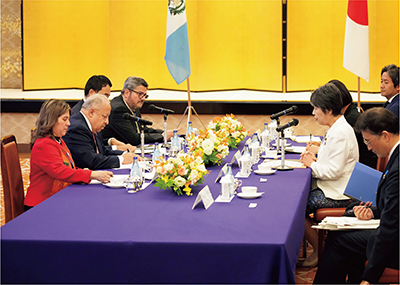 Japan-Guatemala Foreign Ministers' Meeting (May 22, Tokyo)
Japan-Guatemala Foreign Ministers' Meeting (May 22, Tokyo)In regard to relations with Costa Rica, in August, First Vice-President Stephan Brunner Neibig visited Japan on behalf of President Rodrigo Chaves and attended the Hiroshima Peace Memorial Ceremony for the first time at the ministerial level. He also held consultations with Chief Cabinet Secretary HAYASHI Yoshimasa. Minister of Foreign Affairs and Worship Arnoldo André, who accompanied the Vice-President, held a foreign ministers' meeting with Foreign Minister Kamikawa.
 Japan-Costa Rica Foreign Ministers' Meeting (August 8, Tokyo)
Japan-Costa Rica Foreign Ministers' Meeting (August 8, Tokyo)In regard to relations with the Dominican Republic, 2024 marked the 90th anniversary of the establishment of diplomatic relations between Japan and the Dominican Republic, and various commemorative events were held in both countries. In the presidential election held in May, incumbent President Luis Rodolfo Abinader Corona was re-elected. Ambassador on Special Mission WATANABE Hiromichi (Member of the House of Representatives) attended the presidential inauguration ceremony held in August and paid a courtesy call on the President, among other activities. In addition, the third Japan-Dominican Republic Policy Consultation was held in February.
In regard to relations with Panama in 2024, which marked the 120th anniversary of the establishment of Japan-Panama diplomatic relations, congratulatory messages were exchanged between the leaders in conjunction with the date of the establishment of diplomatic relations, January 7. Commemorative ceremonies were held in both Japan and Panama, and the introduction of visa exemption for short-term stays by Panamanian nationals was announced. In addition, in February, Foreign Minister Kamikawa visited Panama and paid a courtesy call on President Laurentino Cortizo Cohen. Furthermore, in the presidential election held in May, candidate José Raúl Mulino of Realizando Metas (RM) party was elected. Ambassador on Special Mission IMAMURA Masahiro (Member of the House of Representatives) attended the presidential inauguration ceremony held in July and paid a courtesy call on the President, in addition to holding meetings with the outgoing and incoming foreign ministers and the Administrator of the Panama Canal Authority.
In regard to relations with Honduras, Parliamentary Vice-Minister for Foreign Affairs Hosaka visited the country in January and paid a courtesy call on President Xiomara Castro, as well as exchanging views with the secretary of foreign affairs, the president of the National Congress, and others. In June, Private Secretary of the President of Honduras Manuel Héctor Zelaya Castro visited Japan and exchanged views with Minister of Land, Infrastructure, Transport and Tourism SAITO Tetsuo and Parliamentary Vice-Minister for Foreign Affairs Hosaka, among others, regarding the interoceanic railway project being promoted by the Government of Honduras.
The Alliance for Development in Democracy (ADD), established in 2021 by Costa Rica, Panama, and the Dominican Republic, aims to promote development, cooperation, trade, and investment through highly transparent processes that respect human rights in the region, while coordinating with the U.S., which positions the Alliance as a group that shares common values and principles. In July, prior to the holding of elections in Venezuela, the ADD issued a statement requesting that the elections be conducted in a free, fair, and transparent manner.
(3) Cuba
The domestic economy has worsened to an extremely serious degree, including the key industry of tourism. Nationwide large-scale blackouts in October and natural disasters have made the lives of the Cuban people increasingly difficult. In response to the damage caused by Hurricane Rafael in November, Japan provided emergency assistance.
(4) Brazil
The administration of Luiz Inácio Lula da Silva worked on initiatives such as launching the Global Alliance Against Hunger and Poverty under the Brazilian G20 presidency. It also positioned environmental and climate change measures as key policy issues. In August, Brazil held the Amazon Summit in Belém in northern Brazil with participation by eight member countries of the Amazon Cooperation Treaty Organization, working to address global challenges.
In regard to relations with Japan, Foreign Minister Kamikawa visited Rio de Janeiro in February to attend the G20 Foreign Ministers' Meeting. She held a meeting with Minister of Foreign Affairs Mauro Vieira, during which she announced Japan's contribution to the Amazon Fund,(5) the first by an Asian country. In May, Prime Minister Kishida made an Official Visit to Brazil, the first by a Japanese prime minister in 10 years. During the summit meeting with President Lula, the two leaders launched the Japan-Brazil Green Partnership Initiative (GPI) to take cooperation on the environment, climate change, and sustainable development to an even higher level. In addition, in November, Prime Minister Ishiba visited Brazil to attend the G20 Rio de Janeiro Summit and held a meeting with President Lula, confirming that the two countries would further strengthen bilateral relations in 2025, the 130th anniversary of the establishment of diplomatic relations between Japan and Brazil.
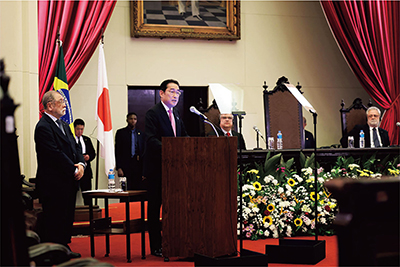 Policy Speech by Prime Minister Kishida at the University of São Paulo (May 4, São Paulo, Brazil; Photo: Official Website of the Prime Minister of Japan and His Cabinet)
Policy Speech by Prime Minister Kishida at the University of São Paulo (May 4, São Paulo, Brazil; Photo: Official Website of the Prime Minister of Japan and His Cabinet)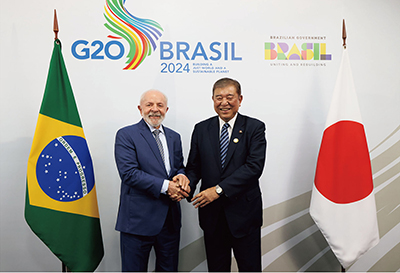 Japan-Brazil Summit Meeting (November 19, Rio de Janeiro, Brazil; Photo: Official Website of the Prime Minister of Japan and His Cabinet)
Japan-Brazil Summit Meeting (November 19, Rio de Janeiro, Brazil; Photo: Official Website of the Prime Minister of Japan and His Cabinet) Prime Minister Ishiba meeting with Nikkei people and Japanese national residents in Rio de Janeiro (November 19, Rio de Janeiro, Brazil; Photo: Official Website of the Prime Minister of Japan and His Cabinet)
Prime Minister Ishiba meeting with Nikkei people and Japanese national residents in Rio de Janeiro (November 19, Rio de Janeiro, Brazil; Photo: Official Website of the Prime Minister of Japan and His Cabinet)Moreover, in regard to economic relations, public and private sector dialogue toward strengthening economic relations between the two countries is being invigorated, including a meeting of the Wise Group for Strategic Economic Partnership between Japan and Brazil held in April, and a meeting of the Japan-Brazil Business Council held in November.
- (5) A fund established by the Government of Brazil with the aim of protecting the Amazon rainforest.
(5) Argentina
President Javier Milei, who took office in December 2023, has made economic and fiscal reconstruction the top priority of his administration. Under his belief in libertarian principles, he has advanced initiatives such as fiscal austerity and deregulation, as pledged in his campaign, and has achieved a certain degree of results in reducing the budget deficit, curbing inflation, and improving the investment environment through the implementation of a large investment incentive scheme. On the other hand, challenges remain, such as managing the legislature with a minority government administration, addressing the rise in the poverty rate, further deregulation, and achieving economic growth that can be sensed by the public.
In regard to relations with Japan, Foreign Minister Kamikawa held a foreign ministers' telephone call with Minister of Foreign Affairs, international Trade and Worship Diana Mondino in January. In March, Minister Mondino visited Japan as a guest of MOFA. During their meeting, the two foreign ministers confirmed the importance of strengthening bilateral relations through the Nikkei community and other means, as well as cooperation in the international arena as important “strategic partners” that share fundamental values and principles. Furthermore, in June, at the G7 Apulia Summit held in Italy, Prime Minister Kishida had an informal talk with President Milei, marking their first interaction, in which they concurred on advancing cooperation between the two countries in the international arena.
(6) Peru
As the APEC Chair for 2024, Peru held meetings across various fields, including the Leaders' Meeting, under the theme of “Empower. Include. Grow.”
In regard to relations with Japan, Parliamentary Vice-Minister for Foreign Affairs KOMURA Masahiro visited Peru in May to attend the APEC Ministers Responsible for Trade (MRT) Meeting. In November, Prime Minister Ishiba and Foreign Minister Iwaya visited Peru to attend the APEC Economic Leaders' Meeting and APEC Ministerial Meeting, respectively. During this time, Prime Minister Ishiba paid an Official Visit and held a summit meeting with President Dina Boluarte. Taking into account the 150th anniversary of the establishment of diplomatic relations between Japan and Peru in 2023, the two leaders adopted a joint statement and a roadmap for building broad cooperation over the next decade. Foreign Minister Iwaya also held a foreign ministers' meeting with Minister of Foreign Affairs Elmer Schialer, in which they confirmed the need to further strengthen bilateral relations.
 Welcoming ceremony during Prime Minister Ishiba's Visit to Peru (November 17, Lima, Peru; Photo: Official Website of the Prime Minister of Japan and His Cabinet)
Welcoming ceremony during Prime Minister Ishiba's Visit to Peru (November 17, Lima, Peru; Photo: Official Website of the Prime Minister of Japan and His Cabinet) Prime Minister Ishiba meeting with Nikkei people residing in Peru (November 17, Lima, Peru; Photo: Official Website of the Prime Minister of Japan and His Cabinet)
Prime Minister Ishiba meeting with Nikkei people residing in Peru (November 17, Lima, Peru; Photo: Official Website of the Prime Minister of Japan and His Cabinet) Japan-Peru Foreign Ministers' Meeting (November 13, Lima, Peru)
Japan-Peru Foreign Ministers' Meeting (November 13, Lima, Peru) Prime Minister Kishida delivering a speech on Japan's foreign policy toward the LAC region (May 4, São Paulo, Brazil; Photo: Official Website of the Prime Minister of Japan and His Cabinet)
Prime Minister Kishida delivering a speech on Japan's foreign policy toward the LAC region (May 4, São Paulo, Brazil; Photo: Official Website of the Prime Minister of Japan and His Cabinet)In May, Prime Minister Kishida visited Brazil and delivered a speech on Japan's foreign policy toward the LAC region, which was the first such speech by a Japanese prime minister in ten years. In it, he reflected on the history between Japan and the LAC region, recalling how LAC countries lent a helping hand to Japan during pivotal moments in Japan's modern history, such as the Meiji Restoration and the post World War II period. He introduced the fact that through a long history of friendship and cooperation, the relationship between the two sides has flourished into an important partnership in which the two countries respect and learn from each other. He also emphasized that as the international order faces new challenges and freedom and democracy are under threat now, it is precisely the time for Japan and the LAC region to look back on the “paths” they have taken together and to show a new “pathway” toward a better future. He called for cooperation rather than division and confrontation, and for making “diversity” and “inclusiveness” the basic premise for resolving issues.
 TAKAMURA Kotaro (Photo: Hanamaki Takamura Kotaro Museum)
TAKAMURA Kotaro (Photo: Hanamaki Takamura Kotaro Museum)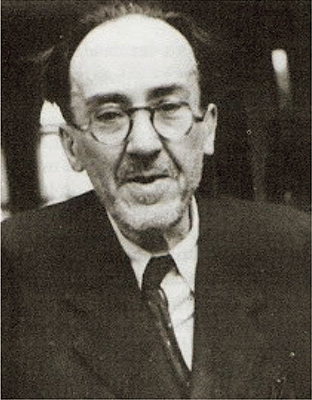 Antonio Machado
Antonio MachadoAt the close of the speech, he noted that both Japanese and Spanish languages have poems about a “path,” introducing “Dotei” by TAKAMURA Kotaro and a poem by the Spanish poet Antonio Machado. Takamura's verse, “There is no road before me. / But a road is created behind me,” resonates beautifully with Machado's nearly contemporaneous verse, “Traveler, there are no roads. / Roads are made by walking.” Is this merely a coincidence? In Japan, many children learn Takamura's “Dotei” in elementary school. In Spain and the LAC region, many people have memorized the beginning of Machado's “Traveler” poem. In other words, the notion of forging one's own path has been cultivated as a life lesson in both Japan and the LAC region, transcending geographical distance and cultural differences. This way of thinking can be seen as the underlying theme that Japan and the LAC region have demonstrated as they shared values and principles while respecting diversity throughout their long history of exchange.
The year 2024 was positioned as the “year of Latin America and the Caribbean,” constituting a favorable opportunity to strengthen Japan-LAC relations, in light of the Asia-Pacific Economic Cooperation (APEC) Economic Leaders' Meeting held in Peru, the G20 Summit held in Brazil, and commemorative events such as those of Japan-CARICOM Friendship Year 2024. However, no matter how favorable the opportunity, it cannot be fully leveraged without the will to turn the “unknown” in front of us into a “path” through our own efforts, and without respect and trust toward others.
The year 2025 marks several milestones, including the 130th anniversary of the establishment of Japan-Brazil diplomatic relations and Japan-SICA (Central American Integration System) Friendship Year 2025 (marking the 90th anniversary of diplomatic relations between Japan and five Central American countries1). The 30th Conference of the Parties to the United Nations Framework Convention on Climate Change (COP30) will also be held in Brazil. Following on from 2024, the year 2025 will also be positioned as part of the “Years of Latin America and the Caribbean,” and it is hoped more than ever that Japan and the LAC region will continue to move forward together, pioneering new “paths” not only for their own national interests but also for the stability of the international community as a whole and the resolution of shared issues facing humanity.
- 1 Five Central American countries: El Salvador, Guatemala, Costa Rica, Nicaragua, and Honduras
(7) Chile
The administration of President Gabriel Boric, which was inaugurated in March 2022, aims to reduce disparities and improve welfare, and is touting promotion of reform of social security policies, including pensions and the tax system. However, the ruling leftist party, which supports the administration, is in the minority in both the upper and lower houses of the National Congress, making it difficult for the administration to implement its various policies. In regard to the new constitution-drafting process, the new draft constitution, which was prepared mainly by the Constitutional Council that was formed in June 2023, was rejected in a national referendum held in December. President Boric announced the end of the new constitution-drafting process during his term.
In regard to relations with Japan, Undersecretary of the Ministry of Foreign Affairs Gloria de la Fuente González visited Japan in June, during which the 10th Japan-Chile Policy Dialogue was held. In this policy dialogue, both countries concurred on deepening cooperative relations in a wide range of fields, including climate change, disaster risk reduction, space, gender equality, and the oceans.
(8) Uruguay
The Luis Lacalle Pou administration, which was inaugurated in March 2020, has maintained a high approval rating with its stable management since its inauguration to the second half of the current term (as of the end of 2024). Uruguay ranked first in the LAC region in the Democracy Index.(6) In economic policy, the administration adheres to free trade principles and places importance on market expansion and liberalization. In terms of foreign policy, it has developed diplomacy based on the values of democracy, the rule of law, and the protection of human rights.
In November, a presidential election was held in conjunction with the end of the incumbent president's term. The opposition candidate Yamandú Orsi, from the Broad Front, was elected as the next president and is scheduled to take office in March 2025.
- (6) Source: Economist Intelligence Unit's Democracy Index 2022
(9) Paraguay
President Santiago Peña Palacios, who took office in August 2023, continues to uphold values and principles such as the rule of law and respect for human rights. He promotes a free and open economic policy, focusing on attracting investment and job creation.
In regard to relations with Japan, Minister of Foreign Affairs Rubén Darío Ramírez Lezcano visited Japan in March and held meetings with Chief Cabinet Secretary Hayashi and Foreign Minister Kamikawa. In May, Prime Minister Kishida visited Paraguay, marking the second such visit by a Japanese prime minister since 2018. During his summit meeting with President Peña, the two leaders concurred that as important partners sharing common values and principles, Japan and Paraguay will cooperate and strengthen relations in wide-ranging fields.
 Joint Press Conference following the Japan-Paraguay Summit Meeting (May 3, Asunción, Paraguay; Photo: Official Website of the Prime Minister of Japan and His Cabinet)
Joint Press Conference following the Japan-Paraguay Summit Meeting (May 3, Asunción, Paraguay; Photo: Official Website of the Prime Minister of Japan and His Cabinet)(10) Colombia
The Gustavo Francisco Petro Urrego administration, which was inaugurated in August 2022 as Colombia's first left-wing government, advocates for a “Government of Change.” Its main policies include inclusive social reforms to address inequality, a transition to a decarbonized economy, and total peace. However, the administration faces difficulties in managing the legislature due to internal conflicts within the coalition government, and no prospects are currently in sight for passing various reform bills. Toward total peace with domestic armed forces, the Petro administration is attempting to advance peace negotiations with armed forces such as the National Liberation Army (ELN),(7) but a path to total peace has yet to emerge.
In regard to relations with Japan, President of the Senate Iván Name visited Japan in February at the invitation of the House of Councillors and exchanged views with the Speaker of the House of Representatives and the President of the House of Councillors. In addition, in September, the first meeting of the Joint Committee between Japan and the Republic of Colombia on Cooperation in Trade, Investment and Industry was held in Colombia, during which representatives from both countries' public and private sectors confirmed that the two countries will advance bilateral trade and investment promotion.
- (7) ELN: Ejercito de Liberacion Nacional, National Liberation Army
(11) Venezuela
In the presidential election held in July, incumbent President Nicolás Maduro declared victory. However, candidate Edmundo González of the opposition Unitary Platform claimed that based on the opposition's own investigation, he had won more than 67% of the vote and thus won the election. In response to the election results, protest demonstrations occurred in various parts of the country. According to media reports, more than 20 people were killed and over 1,100 were arrested. The transparency of the electoral process, including vote counting, has been called into question both domestically and internationally. The Maduro administration expelled the Venezuelan-based diplomats of Argentina, Costa Rica, Peru, Panama, and Uruguay, which recognized candidate González as the winner of the election, as well as of Chile and the Dominican Republic, which raised doubts regarding the transparency of the electoral process. In addition, the Maduro administration recalled Venezuelan diplomats stationed in those countries. Meanwhile, countries such as Cuba, Nicaragua, and Honduras expressed their support for President Maduro, and a serious division has emerged within the LAC region over the situation in Venezuela. Regarding this election, Japan has called for ensuring the transparency of the presidential election process by disclosing all information necessary to support the reliability of the voting results so that the will of all Venezuelans who casted their ballots is respected.
In September, an arrest warrant was issued for the opposition Unitary Platform candidate Edmundo González, who subsequently went into exile in Spain. In response, countries including the U.S., Germany, and France as well as the EU issued statements criticizing the Maduro administration. In addition, in September and November, the U.S. announced additional individuals subject to sanctions against Venezuela. The Maduro administration reacted strongly, and tensions between the two sides have intensified.
Due to the worsening economic, social, and humanitarian situation in the country, Venezuelan nationals are continuing to flow into neighboring countries as refugees and migrants, and receiving them has become a regional challenge.
Japan has provided 130 million U.S. dollars in assistance to support both Venezuelan people, including people fleeing from Venezuela, and surrounding countries.
(12) Bolivia
In Bolivia, in relation to the presidential election scheduled for 2025, there is a conflict between former President Juan Evo Morales Aima, who has declared his candidacy, and President Luis Alberto Arce Catacora, who is seeking re-election. There is ongoing turmoil, including road blockades carried out by Morales supporters and clashes between those supporters and the police.
Regarding the economy, Bolivia's economic structure depends on exports of natural resources. However, the country's budget deficit is ballooning and foreign currency shortages are becoming more serious due to a sharp decline in natural gas reserves. On the other hand, Bolivia's estimated lithium resources are the largest in the world.
The Bolivian government has intensified its efforts toward lithium exploration and extraction, including signing an agreement in September with a Russian company and another in November with a Chinese company for the construction of lithium plants.
In regard to relations with Japan, 2024 marked the 110th anniversary of the establishment of diplomatic relations between Japan and Bolivia, as well as the 125th anniversary of Japanese immigration to Bolivia. Throughout the year, various commemorative events were held in both countries. In February, the first Japan-Bolivia Foreign Ministers' Meeting in approximately 11 years was held, in which the ministers confirmed further strengthening of bilateral relations. In addition, in April, on the occasion of the ceremony held in Bolivia to commemorate the 110th anniversary of the establishment of diplomatic relations between Japan and Bolivia, Foreign Minister Kamikawa delivered a congratulatory video message. In October, Japan provided emergency relief goods in response to the damage caused by forest fires in the country, in light of the humanitarian perspective and the close relations between Japan and Bolivia.
(13) Ecuador
The administration of President Daniel Noboa, which was inaugurated in November 2023, declared a 60-day nationwide state of emergency in January following the prison escape of a criminal organization leader. Through a presidential decree, the administration also declared that the country was in a state of armed conflict with criminal organizations. The administration has since taken steps to restore public safety, including the construction of large-scale prisons and strengthening controls at borders and ports. In addition, in response to a historic drought and the resulting decline in the capacity of hydroelectric power generation, which is a major power source, the administration implemented planned power outages.
In regard to relations with Japan, Ecuador continued to serve as a non-permanent member of the United Nations Security Council (UNSC) alongside Japan in 2024, as it also did in 2023. The two countries cooperated on responses to the current severe international situation and on strengthening the functions of the UN, including UNSC reform.
Bolivia is a geographically distant nation located on the opposite side of the world from Japan. However, many people may have seen photos of the Andes Mountains, which are over 4,000 meters high, and Salar de Uyuni, which is said to be the largest salt flat in the world. Here, this column introduces the long history of friendship between Japan and Bolivia.
■A History of Friendship
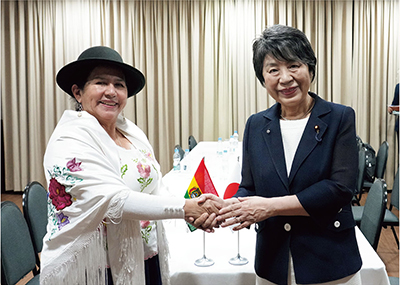 Foreign Minister Kamikawa and Minister of Foreign Affairs Sosa at the Japan-Bolivia Foreign Ministers' Meeting (February 22, Rio de Janeiro, Brazil)
Foreign Minister Kamikawa and Minister of Foreign Affairs Sosa at the Japan-Bolivia Foreign Ministers' Meeting (February 22, Rio de Janeiro, Brazil) The logo commemorating the two anniversaries. It features motifs such as the national flags of both countries and the kanji character “絆” (kizuna, which means bonds) at the center.
The logo commemorating the two anniversaries. It features motifs such as the national flags of both countries and the kanji character “絆” (kizuna, which means bonds) at the center.In 2024, Japan and Bolivia celebrated the 110th anniversary of the establishment of diplomatic relations and the 125th anniversary of Japanese immigration to Bolivia. In February, the first Japan-Bolivia Foreign Ministers' Meeting in approximately 11 years was held, during which Foreign Minister Kamikawa and Minister of Foreign Affairs Celinda Sosa Lunda concurred on strengthening bilateral relations. In March, a commemorative logo representing the two anniversaries was announced. In April, a commemorative ceremony for the 110th anniversary of the establishment of Japan-Bolivia diplomatic relations was held in Bolivia, and Foreign Minister Kamikawa sent a video message expressing her congratulations. Taking advantage of this opportunity, the two countries are further building their close relationship.
The first Japanese immigrants to Bolivia arrived in 1899. Among those who had initially migrated to Peru, some crossed the Andes Mountains and settled in Bolivia. After World War II, Japanese immigrants faced great hardship developing the land in the Okinawa and San Juan settlements, which were Nikkei (Japanese immigrants and their descendants) communities established near Santa Cruz in eastern Bolivia. However, through activities such as rice and soybean cultivation and poultry farming, these immigrants helped develop the region into one of Bolivia's leading agricultural production areas. Today, more than 13,000 Nikkei people live throughout Bolivia, playing a vital role as bridges of friendship between Japan and Bolivia.
■Cooperation with Bolivia
 The emergency relief goods handover ceremony in response to forest fire damages (October 9, Santa Cruz, Bolivia)
The emergency relief goods handover ceremony in response to forest fire damages (October 9, Santa Cruz, Bolivia)In June, forest fires began in Bolivia and spread across the country, resulting in casualties, many people being affected, and material damages. In October, the Government of Japan provided emergency relief goods to Bolivia in order to support people affected by the disaster. In addition, Japan has been engaged in supporting Bolivia for many years. Focusing on key areas such as “developing economic infrastructure and diversifying the production sector” and “promoting social inclusion,” Japan has cooperated toward Boliva's development in various fields. These fields include the construction of Viru Viru International Airport in Santa Cruz, the paving and improvement of the Okinawa Road connecting Nikkei settlements, renewable energy development, construction of school buildings for educational facilities, and provision of medical equipment.
■Toward the Future
The number of Nikkei people in Bolivia is the fifth highest in the Latin American and the Caribbean region. Among them, Nikkei people in Bolivia are enthusiastic about Japanese language education, with young people who speak Japanese. Japanese culture continues to be passed down in the Japanese settlements, where traditional Japanese festivals are held.
It is expected that Japan and Bolivia will continue to nurture their fraternal bonds and cooperate together through various exchanges.


